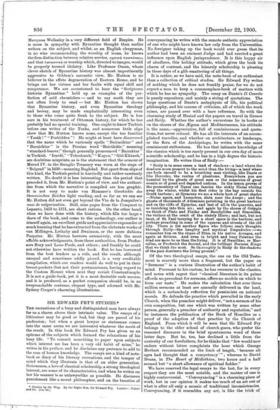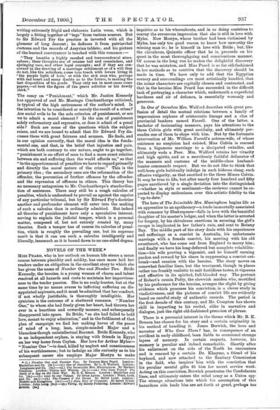SIR EDWARD FRY'S STUDIES.*
THE recreations of a busy and distinguished man have always for us a charm above their intrinsic value. The essays of a litterateur may be good or bad, but they are parcel of his profession ; but when a great lawyer or statesman comes into the same arena we are interested whatever the merit of the result. In this book Sir Edward Fry has given us an epitome of the subjects which formed the relaxations of his busy life. " To commit something to paper upon subjects which interest me has been a very old habit of mine," he writes in his preface, and he disclaims any pretence to add to the sum of human knowledge. The essays are a kind of note- book or diary of his literary recreations, and the temper of mind which they illustrate is that of an elder generation. Seriousness, a love of classical scholarship, a strong theological interest, are some of its characteristics, and when he writes on law his manner is as unlawyerlike as possible. He discusses punishment like a moral philosopher, and on the beauties of • Studies by the Way. By the Right Hon. Sir Edward Fry. London : Nisbet and Co. Ms. 6d.] conveyancing he writes with the remote ;Esthetic appreciation of one who might have known law only from the Universities. No foreigner taking up the book would ever guess that its author had been an eminent Judge and had exerted a great influence upon English jurisprudence. It is this happy air of aloofness, this holiday attitude, which gives the book its
charm of contrast, and the leisurely scholarship is pleasing in these days of a glib smattering of all things.
It is rather, as we have said, the note-book of an enthusiast than a collection of critical studies. Sir Edward Fry writes of nothing which he does not frankly praise, for we do not expect a man to keep a commonplace-book of matters with
which he has no sympathy. The essay on Dante's Il Convito is purely expository, and mainly a string of quotations. The
large questions of Dante's metaphysic of life, his political philosophy, and his canons of criticism, all of which the work raises, are passed over with a bare reference. So with the charming study of Hesiod and the papers on travel in Greece and Sicily. Whether the author's excursions lie in books or on the shores of the .Egean and Mediterranean, his attitude is the same,—appreciative, full of reminiscences and quota- tions, but never critical. He has all the interests of an accom- plished traveller, and whether on architecture, or landscape, or the flora of the .Archipelago, he writes with the same reminiscent enthusiasm. He has that intimate knowledge of the classics which is too rarely present in our own day of more scientific scholarship, and he has in a high degree the historic imagination. He writes thus of Sicily :—
" Sicily is in some sense a land of shadows—a land where the dead are more present to the mind than the living—a land where one feels oneself to be a breathing man visiting, like Dante or like Hercules, the realms of phantoms. Everywhere you are haunted by the ghosts of great men or the memories of great events or of great and departed nations. In the lemon groves of the promontory of Naxos one fancies the sickly Nicias whiling away the winter, whilst his fleet rides in the bay outside the Greek harbour ; at Syracuse we see a whole host of great shades —Nicias again, and Lamachus, slain near the Anapo ; and the ghosts of thousands of Athenians perishing in the great harbour and on the cliffs of Epipolae, and last of all in the quarries, and so vanishing into thin air; and again by the shores of Ortygia we think of Plato and Pindar and Bacchylides and Simonides, the visitors at the court of the stately Hiero; and last, but not least, of St. Paul tarrying for a short space in the harbour, and perhaps preaching in some of the squares and streets of the old city. There is yet another figure who follows one's thoughts through Sicily—the haughty and mystical Empedocles :—we remember him on the slopes of Etna, in his native Acragas, and again at Selinus. And even in bright and busy Palermo the dead are more to us than the living. It is of Ramilkar, or Mar- cellus, or Frederick the Second, and the brilliant Norman Kings that we think the most. So thoroughly in Sicily do the shadows of the past dominate the living present."
Of the two theological essays, the one on the Old Testa-
ment is scarcely more than a fragment, but the paper on " Sermons " is a curious illustration of the author's habit of
mind. Pursuant to his custom, he has recourse to the classics, and notes with regret that " classical literature in its prime affords no precedent for sermons, offers no models on which to form our taste." He makes the calculation that over three million sermons at least are annually delivered in the land, which is a melancholy reflection for pessimists on national morals. He defends the practice which prevailed in the early Church, when the preacher might deliver, "not a sermon of his own composition, but one which was written by some other person, generally a preacher of authority and reputation," and he instances the publication of the Book of Homilies as a proof of the adoption of that practice by the Church of England. From which it will be seen that Sir Edward Fry
belongs to the older school of church goers, who prefer the reasoned discourse to the brief spontaneous word of these latter days. But he, too, has declined a little from the austerity of our forefathers, for he thinks that "few would now endure without bitter complaints the hour which George Herbert recommended as the limit of length, because all ages had thought that a competency' " ; whereas to David Deans, in The Heart of Midlothian, two hours and a half seemed but " a short allowance of spiritual fodder."
We have reserved the legal essays to the last, for in every respect they are the most notable, and the matter of one is highly controversial. " Conveyancing " is a charming piece of work, but in our opinion it makes too much of an art out of what is after all only a mosaic of traditional inconsistencies. Conveyancing, if it resembles any art, is like the trick of writing extremely frigid and elaborate Latin verse, which is largely a fitting together of "tags" from various sources. But to Sir Edward Fry the practice is invested with all the glamour of long descent ; he deduces it from patriarchal customs and the records of Assyrian tablets ; and his picture of the learned conveyancer is touched with this romance :—
" They breathe a highly rarefied and transcendental atmo- sphere; their thoughts are of estates tail and remainders, and springing uses, and other legal concepts ; and if they are con- cerned in the drawing of a marriage settlement or of a will they do not, like the solicitors, come into touch with lovers living in the purple light of love,' or with the sick man who, perhaps with sad heart and many doubts as to the future, is making the last disposition of his goods. They only see in most cases some papers,—at best the figure of the grave solicitor or his dowdy clerk."
The essay on "Punishment," which Mr. Justice Kennedy has approved of and Mr. Montagu Crackanthorpe criticised, is typical of the high seriousness of the author's mind. Is the intention to be considered or merely the result of a crime? Are social evils to be the sole criterion of punishment, or are we to admit a moral element ? Is the aim of punishment solely reformatory and repressive, or does it admit of a penal side ? Such are some of the questions which the subject raises, and we are bound to admit that Sir Edward Fry dis- cusses these with great fairness and acumen. He finds, and in our opinion correctly, that the moral idea is the funda- mental one, and that, in the belief that injustice and pain, which are both contrary to our nature, ought to go together, " punishment is an effort of man to find a more exact relation between sin and suffering than the world affords us," so that " in the apportionment of penalties we have to regard primarily and directly the moral nature of the crime." This is the primary idea ; the secondary ones are the reformation of the offender, the prevention of further offences by the offender, and the repression of offences in others. This theory has no necessary antagonism to Mr. Crackanthorpe's standardisa- tion of sentences. There may still be a rough calculus of penalties, which is understood to prevail as against the caprice of any partienlsr tribunal, but by Sir Edward Fry's doctrine another and profounder element will enter into the making of such a calculus than is ordinarily admitted. But indeed all theories of punishment have only a speculative interest, serving to explain the judicial temper, which is a personal matter, composed of, but not entirely created by, many theories. Such a temper has of course its calculus of penal- ties, which is roughly the prevailing one, but its supreme merit• is that it can use such a calculus intelligently and liberally, inasmuch as it is bound down to no one-sided dogma.







































 Previous page
Previous page